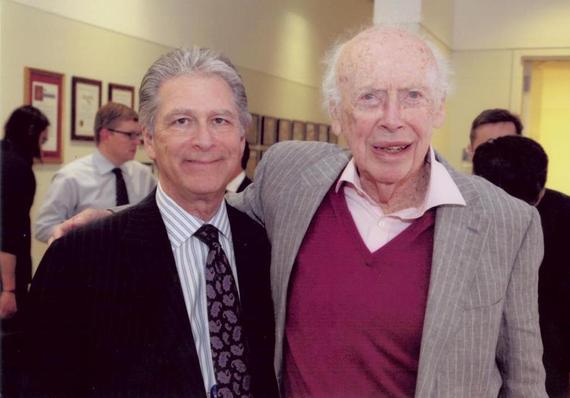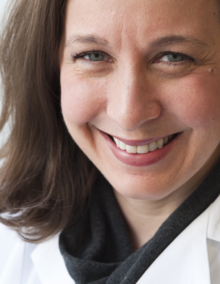In the last blog, I wrote about starting treatment with Dr. Isacoff in Los Angeles to find a way to deal with Stage IV pancreatic cancer. Since I live in New York City, Dr. Isacoff introduced me to Dr. Allyson Ocean, who collaborates with him on treatment.
Dr. Ocean is an excellent oncologist specializing in gastrointestinal cancers, and she is also involved in research on the use of radiolabeled antibodies and viral therapies for targeted therapy for pancreatic cancer.
And Dr. Ocean conveys the perspective that treatment for pancreatic cancer is not rigid, that it has to evolve and respond to reflect an individual patient's needs.
In working with Dr. Isacoff and Dr. Ocean, I am being treated by doctors willing to be creative, take risks, and apply the best science as soon as possible. Their approach has made all the difference in how I live today.
Dr. Isacoff designed a treatment plan where my medications are given at low doses over a three-week period. This protocol is comprised of several different chemotherapies based on a blood analysis of how my tumor will respond to these therapies.
This treatment may not be right for other patients with pancreatic cancer; every experience is individual, but it is working for me. My side effects are very minimal, and I am doing well, experiencing reduction of my disease.
In discussing his views on slow dosing, Dr. Isacoff states:
Standard chemo for pancreatic cancer is usually given at very high doses, which can prolong the time for patients to recover during which cancers can acquire resistance. By contrast, low doses of continuously administered drugs result in fewer side effects, are easier on the patient, and have been associated with substantial disease reduction.

Here is Dr. Isacoff (on the left, with James Watson, Nobel Prize Winner and discover of the structure of DNA)
BARGAINING
Dr. Isacoff and Dr. Ocean are using new science to shape my treatment. I know it is a bargaining chip -- so to speak. But I would rather bargain on new science than standard guidelines.
First, to help determine the combination of chemotherapies in my treatment, my doctors utilize an innovative protein and blood analysis involving circulating tumor cells to identify the best potential chemotherapy combination for my tumor. Thus my particular combination of chemo therapy is personalized to my tumor's sensitivity to specific medications.
Second, Dr. Isacoff and Dr. Ocean have added synthetic Vitamin D to my treatment. Synthetic Vitamin D was added after new findings were announced in September 2014 from the Salk Institute. Led by Dr. Ron Evans, the research showed that "the synthetic derivative of vitamin D collapsed the barrier of cells shielding pancreatic tumors, making this seemingly impenetrable cancer much more susceptible to therapeutic drugs."
Clinical trials in synthetic Vitamin D are underway at the University of Pennsylvania for those who have had surgery. New clinical trials in Vitamin D are expected to be funded by The Lustgarten Foundation.
Third, for future research outcomes, I have donated tumor cells to support a new research mechanism in pancreatic cancer, called an organoid.
Dr. David Tuveson is leading the new Pancreatic Cancer Laboratory funded by The Lustgarten Foundation at Cold Spring Harbor. Dr. Tuveson and his colleagues have developed pancreatic cancer organoids that will provide investigators with living three-dimensional models of tumor tissue to find new ways to detect and treat pancreatic cancer. This advancement was reported in the January 2015 issue of the journal Cell.
The aim now is to use the living tumor tissue in organoids to test a variety of treatments that may be helpful to patients in the future.
My doctors have connected me to some of the best scientists in the country.
Despite these gains, I am depressed and angry.
DEPRESSION
I am depressed and angry that there are not many top oncologists who specialize in pancreatic cancer and who know how to integrate the latest scientific findings.
So, patients and families need to find experts who do exist -- at least consult with these doctors -- to understand how best to utilize new science for their treatments and to learn about the best clinical trials for them.
Experts in pancreatic cancer are also more likely to recommend genetic testing to shape treatment. Testing can be critical if the BRCA gene mutation is identified, for example. And, as genomic testing becomes more sophisticated, we need to know how testing our tumors, their mutations, and DNA will help connect us to a treatment that will make a difference for us.
We must overcome the conventional resignation even from oncology community -- that very little can be done for pancreatic cancer. This resignation permeates us, and often prevents us from fighting for the best treatments possible. It seems to me that people are settling for recommendations from general oncologists that simply are not working.
As Dr. Ocean said to me, "I still receive a surprising number of calls from oncologists asking for advice, who are using one single drug as the first line treatment. This is not even considered effective treatment anymore, especially in people who are strong enough to tolerate combination chemotherapy.
ACCEPTANCE
So, I am at acceptance -- acceptance of the fact that patients and families must drive the action. We must ensure that we are getting the most creative, effective treatments, designed personally for us.
As Dr. David Tuveson noted, in describing the potential of the organoid, "Pancreas Cancer is the most lethal because we have the weakest medications available -- and that's for any form of cancer."
Most of us cannot conduct biologic and molecular research, but we must advocate aggressively for the use of promising new science and publicly demand that this science move quickly into medications that work.
